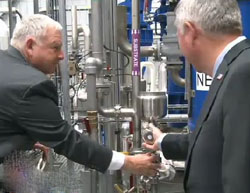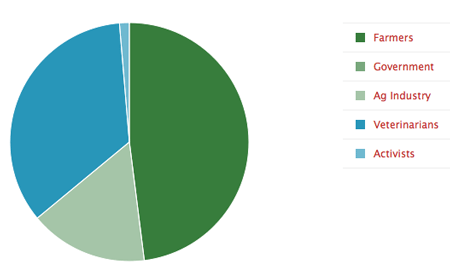 Advanced biofuels took a $200 million step forward on the march toward commercialization Wednesday with the official opening of Novozymes’ enzyme plant in Blair, Nebraska.
Advanced biofuels took a $200 million step forward on the march toward commercialization Wednesday with the official opening of Novozymes’ enzyme plant in Blair, Nebraska.
The inauguration of Novozymes’ new Blair facility was celebrated with employees, customers, community leaders and government officials, including the governor of Nebraska, Dave Heineman, U.S. Department of Energy Senior Advisor Jason Walsh and Blair Mayor James Realph. The governor and the mayor together ceremonially started the fermentation process at the plant. “The grand opening of Novozymes is important for the ethanol industry and for energy independence,” said Governor Dave Heineman. “Nebraska is one of the top producers of ethanol in America, which makes our state the perfect site for this facility.”
 With the 100 new jobs created by the plant opening, Agriculture Secretary Tom Vilsack highlighted the importance of expanding tax credits for investments in clean energy manufacturing for the economy during a conference call today with Novozymes President Adam Monroe. Novozymes leveraged its $200 million private investment in the Blair facility with a 48C manufacturing tax credit from the federal government.
With the 100 new jobs created by the plant opening, Agriculture Secretary Tom Vilsack highlighted the importance of expanding tax credits for investments in clean energy manufacturing for the economy during a conference call today with Novozymes President Adam Monroe. Novozymes leveraged its $200 million private investment in the Blair facility with a 48C manufacturing tax credit from the federal government.
“This program (48C) along with several other tax credits really create the opportunity for a clean energy future with three very important results,” said Vilsack. Those results, he says, include increasing farm income, creating jobs, and reducing reliance on foreign oil.
Monroe says biofuels currently make up 16% of Novozyme’s $2 billion in revenues. “We’ve done a number of research projects funded by DOE and have reduced the cost of the key enzymes needed for advanced biofuels production by 90%,” he said. “Now it’s about getting steel in the ground and moving ahead. We wanted to be ready when this industry commercialized and now we are.”
Listen to comments from Secretary Vilsack and Adam Monroe here: Vilsack/Monroe press conference


 Senator Debbie Stabenow (D-MI) highlighted the benefits of next-generation biofuels during a tour of the
Senator Debbie Stabenow (D-MI) highlighted the benefits of next-generation biofuels during a tour of the  Speaking on Iowa Public Television’s
Speaking on Iowa Public Television’s 
 More farmers are growing weeds to harvest for biodiesel.
More farmers are growing weeds to harvest for biodiesel. 



 Obama spoke to workers at TPI Composites, a company that makes blades for wind turbines and employs more 700 people. “If Congress doesn’t act, companies like this one will take a hit,” he said. “Jobs will be lost. That’s not a guess, that’s a fact. We can’t let that happen.”
Obama spoke to workers at TPI Composites, a company that makes blades for wind turbines and employs more 700 people. “If Congress doesn’t act, companies like this one will take a hit,” he said. “Jobs will be lost. That’s not a guess, that’s a fact. We can’t let that happen.”